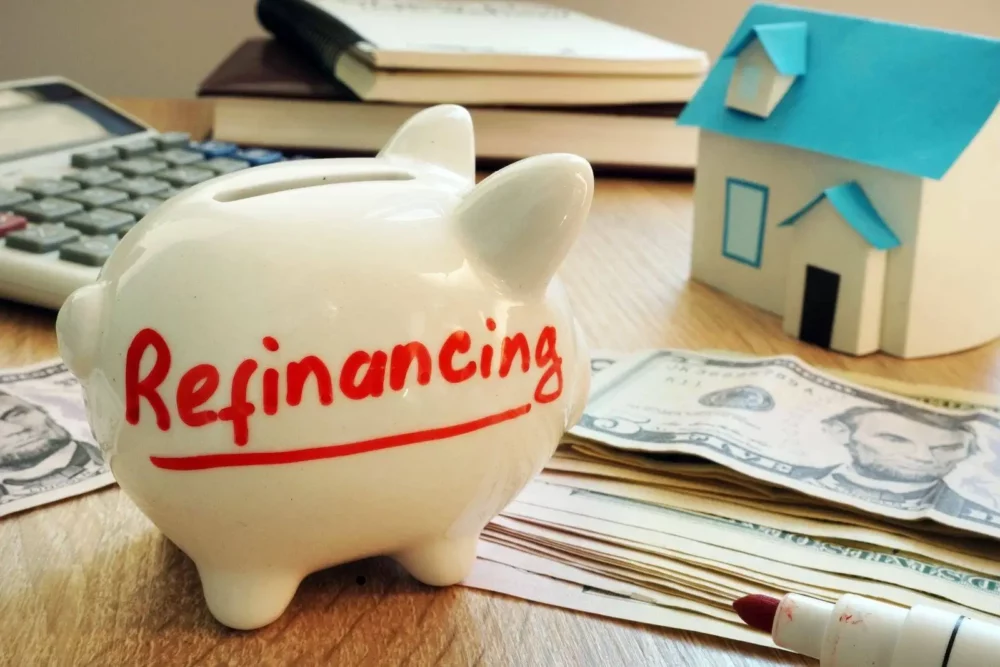Investing in real estate can be a lucrative venture, but as a savvy investor, have you considered the benefits of refinancing your investment property? Refinancing offers a pathway to unlock the potential for even greater returns. In this article, we’ll explore what refinancing an investment property entails, why it is important for property owners like you, and provide an overview of the content that will be covered.

A. What is refinancing an investment property?
Refinancing an investment property involves replacing your current mortgage with a new one, typically with better terms and conditions. It essentially allows you to secure a new loan to pay off the existing one. By refinancing, you gain the opportunity to take advantage of lower interest rates, access additional funds for property improvements or other investments, and potentially benefit from tax advantages.
B. Importance of refinancing for investment property owners
Refinancing holds immense importance for investment property owners like you. It offers a range of advantages that can significantly impact your financial well-being. By refinancing, you can lower your interest rates and reduce monthly payments, freeing up cash flow for other investments or property maintenance. Additionally, refinancing allows you to tap into the equity you’ve built in your property, providing access to funds for expansion or diversification. Moreover, refinancing can offer tax advantages, further enhancing your overall returns.
C. Overview of the article’s content
Throughout this article, we will delve into the benefits of refinancing an investment property, factors to consider before refinancing, step-by-step guidance on the refinancing process, and valuable tips for a successful refinancing experience. By the end, you will have a comprehensive understanding of how refinancing can unlock the true potential of your investment property.

So, let’s dive into the world of refinancing and seize the opportunity to maximize your investment returns.
Benefits of Refinancing an Investment Property
Investment property owners who choose to refinance can reap numerous benefits that can significantly impact their financial situation. Let’s explore the advantages that refinancing offers:
A. Lower interest rates and reduced monthly payments
One of the primary benefits of refinancing an investment property is the potential to secure a new loan with lower interest rates than your current mortgage. As interest rates fluctuate over time, refinancing provides an opportunity to take advantage of favorable market conditions. By obtaining a lower interest rate, you can reduce your monthly mortgage payments, freeing up valuable cash flow that can be directed towards other investments or property-related expenses.
B. Access to cash for property improvements or other investments
Refinancing your investment property allows you to tap into the equity you have built over time. Equity refers to the difference between the property’s market value and the outstanding mortgage balance. By refinancing, you can access this equity and convert it into cash. This influx of funds can be utilized for property improvements, such as renovations or repairs, to enhance the property’s value. Additionally, you can use the cash to diversify your investment portfolio or seize other lucrative investment opportunities.
C. Tax advantages and increased cash flow
Refinancing an investment property can also provide tax advantages and boost your cash flow. The interest paid on a mortgage is generally tax-deductible, and by refinancing, you may be able to deduct a larger portion of your interest payments. This can result in significant tax savings, reducing your overall tax liability. Moreover, the increased cash flow resulting from lower monthly mortgage payments can provide you with more financial flexibility and stability, enabling you to allocate resources towards other investments or savings.

By capitalizing on the benefits of refinancing, investment property owners can optimize their financial position, increase their property’s value, and unlock new avenues of growth. In the next section, we will delve into the factors you should consider before pursuing refinancing.
Steps to Refinance an Investment Property
Refinancing an investment property requires careful planning and execution. By following these essential steps, you can navigate the process smoothly and maximize the benefits of refinancing.
A. Assessing the Property’s Value and Equity
Before proceeding with refinancing, it is crucial to assess the current value and equity of your investment property. Conduct a thorough evaluation to determine how much your property has appreciated over time and how much equity you have built. This information will help you understand your borrowing capacity and negotiate favorable terms with lenders.
B. Researching and Comparing Lenders and Loan Options
Next, embark on a comprehensive research journey to find the most suitable lender and loan options for your refinancing needs. Compare interest rates, loan terms, and repayment conditions offered by different lenders. Look for lenders experienced in investment property refinancing, as their expertise can prove invaluable throughout the process. Take your time to find the best possible deal that aligns with your financial goals.
C. Gathering Necessary Documents and Completing the Application Process
Once you’ve identified the ideal lender, gather all the necessary documents required for the refinancing application. This typically includes personal identification, income verification, tax returns, property documents, and other financial statements. Prepare these documents in advance to expedite the application process and ensure a smooth transition.
D. Undergoing Property Appraisal and Loan Approval
After submitting your application, the lender will initiate a property appraisal to determine its current market value. This step is essential to assess the loan-to-value ratio and validate the property’s worth. Once the appraisal is complete, the lender will review your application, assessing your creditworthiness and financial stability. If all criteria are met, you will receive loan approval, and the refinancing process will move forward.
E. Closing the Refinancing Deal and Transferring Funds
The final step involves closing the refinancing deal and transferring funds. You will receive a Closing Disclosure document, which outlines all the details of the loan, including interest rates, fees, and repayment terms. Review this document carefully and seek clarification if needed. Once you’re satisfied, sign the necessary paperwork and complete the closing process. The lender will then transfer the funds to pay off your existing mortgage, and your investment property will be successfully refinanced.
By diligently following these steps, you can navigate the refinancing process with confidence and optimize the benefits available to you.
Tips for Successful Refinancing
Refinancing an investment property requires careful planning and execution to ensure a successful outcome. Here are some essential tips to guide you through the process and help you make the most of your refinancing endeavor.

A. Improve credit score and financial stability before applying
Before embarking on the refinancing journey, take the time to assess and improve your credit score. A higher credit score not only increases your chances of securing a favorable loan, but it also opens doors to better interest rates and loan terms. Pay off outstanding debts, maintain a low credit utilization ratio, and make timely payments to boost your creditworthiness. Additionally, ensure your financial stability by managing your finances prudently and maintaining a steady income.
B. Shop around for the best interest rates and loan terms
Don’t settle for the first lender that comes your way. Take the initiative to explore multiple lenders and compare their offerings. Different lenders may have varying interest rates, closing costs, and loan terms. By shopping around, you can identify the most competitive rates and terms that align with your financial goals. Consider reaching out to online mortgage marketplaces or consulting with local banks and credit unions to expand your options.
C. Consider working with an experienced mortgage broker or financial advisor
Navigating the intricacies of refinancing can be overwhelming, especially if you’re new to the process. Consider enlisting the help of an experienced mortgage broker or financial advisor. These professionals possess in-depth knowledge of the market, lending options, and can provide personalized guidance tailored to your unique circumstances. They can analyze your financial situation, recommend suitable loan options, and negotiate on your behalf to secure the best possible terms.
D. Negotiate favorable terms and fees with the chosen lender
Once you’ve identified a lender that meets your requirements, don’t be afraid to negotiate. Take the initiative to discuss and negotiate the terms and fees associated with the refinancing. Lenders may be open to adjusting certain aspects of the loan, such as interest rates, closing costs, or prepayment penalties. Be prepared to present your case, highlighting your financial stability and creditworthiness. Negotiating favorable terms can significantly impact your overall savings and ensure a successful refinancing experience.
By following these tips, you can position yourself for a successful refinancing journey, maximizing your savings and achieving your investment goals. Remember, every step you take towards a well-informed and strategic approach brings you one step closer to unlocking the true potential of your investment property.
Conclusion
In conclusion, refinancing an investment property can be a game-changer for property owners looking to maximize their returns. By taking the time to explore refinancing options, you can potentially benefit from lower interest rates, increased cash flow, and access to additional funds for property improvements or other investments.

Throughout this article, we have discussed the importance of refinancing for investment property owners and provided insights into the factors to consider before making the decision to refinance. We have also outlined the step-by-step process of refinancing and shared valuable tips for a successful experience.
Now that you have a deeper understanding of the benefits and considerations associated with refinancing, it’s time to take action. Evaluate the current market conditions, assess your loan-to-value ratio and equity in the property, and ensure your credit score and financial stability are in good shape. By doing so, you will be better positioned to negotiate favorable terms and fees with lenders.
Remember, the path to achieving greater returns on your investment property starts with exploring refinancing opportunities. Don’t let the potential benefits slip through your fingers. Take the initiative and seize the opportunity to unlock the true potential of your investment property.





